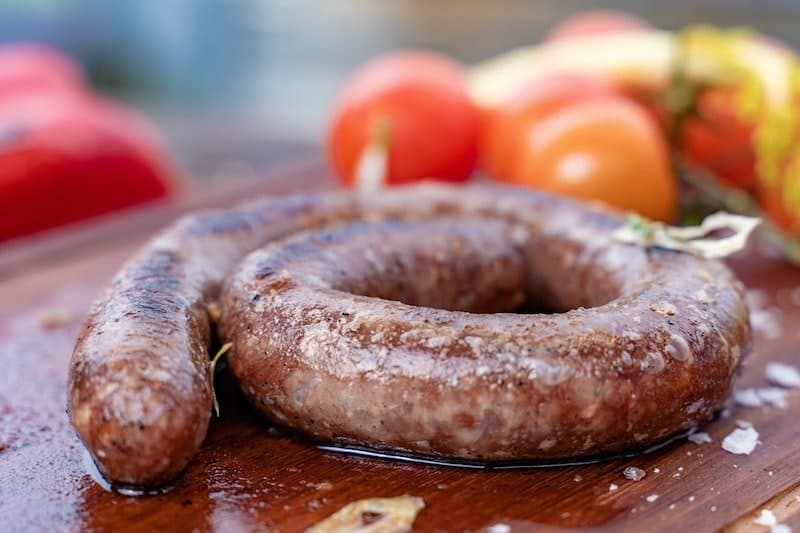Does Fresh Sausage Have Nitrates?
A hot topic of discussion when buying hot dogs or sausages from the store is the nitrates that are used in them as preservatives. What are nitrates exactly? Are they safe?
And more importantly, does fresh sausage have nitrates since you make it at home?
Keep reading if you want to know the answers to these questions.
What Are Nitrates and Why Are They Used in Meat?
Nitrates are chemical compounds that occur naturally in air, soil, and water.
In the food industry, they’re salts that are used as preservatives to prevent the growth of harmful bacteria and prevent meat from spoiling too quickly.
Nitrates are often added to processed meat like ham or bacon, deli cuts, hot dogs, and sausages. All of these are pinkish in color, which is actually caused by the nitrates added to them. Nitrates also contribute to the salty flavor in these types of meat.
Does Fresh Sausage Contain Nitrates?
Fresh sausages (like Italian sausage, for example) don’t contain nitrates because you’re just making them with fresh meat and natural salt (and not curing salt). If you want to make dry-cured sausages, however, then you’d be adding curing salt to the mix, which does contain sodium nitrite and sodium nitrate. For more on the difference between fresh sausage and cured sausage, click here.
Preservatives like nitrates are added to processed meats in the food industry to prolong the shelf life. This makes sense from a business perspective for mass-producing products and saving money.
But if you want to eat fresh sausages, you don’t need to use preservatives. And if you want to make large batches of sausages to have for later use, you can just freeze them! This is an excellent, safer alternative.
More often than not, cured sausages are cold smoked. They can be cold smoked because they have cure in them to protect them from contamination by bacteria. You can however, still smoke sausage that isn’t cured. Click here to learn more.
Are Nitrates Bad For You?
Some vegetables (for example, beets, spinach, celery, and carrots) naturally have a high nitrate content. They acquire nitrates from the soil.
We all know that vegetables are good for you, and beets, for example, have shown to lower blood pressure and improve physical performance.
Also, commonly used medications for angina (a heart condition where blood flow to the heart is severely restricted) have nitrates as the active ingredient. Nitrates help to open up the blood vessels and improve blood flow to the heart.
However, when it comes to processed meat, it has been shown that eating large amounts of processed meat can be linked to cancer (specifically stomach and intestinal cancer).
It’s not actually the nitrates in processed meat that cause cancer, but a compound called nitrosamines. When nitrates are in an acid environment like the stomach, and have a source of proteins (which processed meats have plenty of), nitrosamines can form.
Nitrosamines can also form when nitrates are cooked at high heat. Like when you fry bacon, for example.
It should be noted that there are a few other reasons that lead to the cancer-causing effect of processed meats as well. It’s not just the nitrates.
But all in all, nitrates themselves aren’t what’s bad for you, it’s just the way you consume them that can lead to negative effects.
How Do You Know if Meat Is Nitrate Free?
Here are some easy ways to tell if the meat you’re about to buy has nitrates in it:
- Check the nutrition label. If it says sodium nitrate or nitrite or potassium nitrate or nitrite, that means that the product contains nitrates.
- If the food is labeled as organic, that means it doesn’t have nitrates in it. Organic foods aren’t allowed to have preservatives like synthetic nitrates or nitrites in them.
- Look on the label to see if it says “nitrate-free”, “no nitrates”, or “no nitrates added”.

Note that the tips above refer to synthetic nitrates and nitrites and not naturally occurring nitrates and nitrites. The label will tell you if synthetic nitrates/nitrites used, but the product could still be preserved with natural nitrates/nitrites.
Meat that’s labeled as “uncured”, for example, contains no synthetic nitrites but can be preserved with natural nitrites found in celery. It’s still not known if uncured meat containing natural nitrites from celery is any less harmful than cured meat containing synthetic nitrites.
In Summary
Hopefully here you’ve learned about what nitrates are, why they’re used in meat, and most importantly, that fresh sausages don’t have nitrates in them.
This is why I highly encourage everyone to make their own sausages because, if you love them like me, you can still eat them without worrying about the health risks associated with store-bought, processed sausages!
References
- The truth about the nitrates in your food. BBC. https://www.bbc.com/future/article/20190311-what-are-nitrates-in-food-side-effects. Accessed 7 December 2020.
- Soman B, Vijayaraghavan G. The role of organic nitrates in the optimal medical management of angina. European Society of Cardiology. 2017;15(2).
- Are Nitrates and Nitrites in Foods Harmful? Healthline. https://www.healthline.com/nutrition/are-nitrates-and-nitrites-harmful#what-are-nitrates-and-nitrites. Accessed 7 December 2020.
- Cured vs. Uncured Bacon. Healthline. https://www.healthline.com/health/cured-vs-uncured-bacon. Accessed 7 December 2020.








